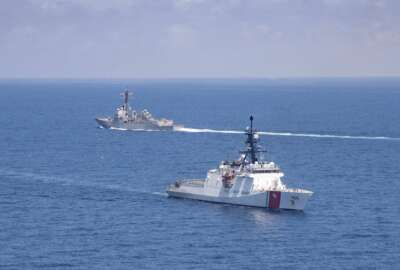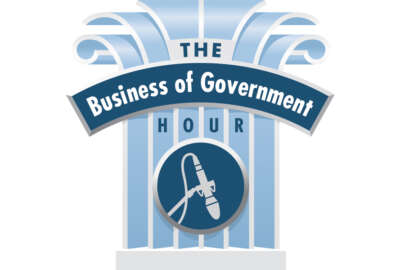A long time Coastie is now the top civilian in Coast Guard intelligence
After spending 30 years in a Coast Guard uniform, this guest has donned a business suit and joined the senior executive service. But he's still with the Coast...
Best listening experience is on Chrome, Firefox or Safari. Subscribe to Federal Drive’s daily audio interviews on Apple Podcasts or PodcastOne.
After spending 30 years in a Coast Guard uniform, this guest has donned a business suit and joined the senior executive service. But he’s still with the Coast Guard, as the new deputy assistant commandant for intelligence. Jeffrey Radgowski joined the Federal Drive with Tom Temin to discuss his new role.
Interview transcript:
Tom Temin: Let’s begin with the intelligence service, the intelligence function at the Coast Guard itself. What is it you cover as the deputy assistant commandant there?
Jeffrey Radgowski: You may know the Coast Guard has 11 statutory missions, I won’t list them all. But people are often familiar with our protection of safety of life at sea, which typically involves search and rescue. A lot of migration cases are involved in that protection of safety of life at sea. Counternarcotics, particularly in the Caribbean or Eastern Pacific, there’s a big push, particularly now for countering illegal, unreported, unregulated fishing and fisheries laws writ large. So those are just a few examples. But Coast Guard intelligence is the driver to execute those missions, as well as providing decision makers in the Coast Guard, and beyond at every level, how we want to go about doing that mission and sort of what our risk calculus is to do a mission.
Tom Temin: And I’m guessing one of the challenges in a job like that is dealing with all of the other federal components in the Defense Department elsewhere in your own Homeland Security Department that also impinge on this whole topic, and deciding who does what and making sure you’re all on the same sheet of music.
Jeffrey Radgowski: Interesting point, I would actually offer that it’s been a big benefit for us to have all of those partners and I found it through working with a lot of them really powerful to be able to partner with those organizations, our lanes in the road through those statutory missions are pretty clear. And then those partners, whether it’s Customs and Border Protection, Department of Defense, FBI, we usually find a natural space where we can work together. So I’ve been, like I said, pleasantly surprised and actually feel very empowered when I work with those other organizations.
Tom Temin: And for the Coast Guard is the issue of intelligence gathering, like it is elsewhere a combination of human intelligence, and also signals intelligence and observation. What are the components that go into the activity?
Jeffrey Radgowski: So we have sort of a pretty broad expanse of intelligence capabilities. We have some from law enforcement, as a regulatory agency. And we’re a member of the national intelligence community as well. So we use our authorities, if you will, from each of those. And that could be something from Coast Guard sector, one of our smaller units could be anywhere along the west coast to our largest units, such as our Intelligence Coordination Center, which is here in the D.C. area that provides that strategic communication.
Tom Temin: And I wanted to mention something or have you talk about something I noticed in your background, as listed by the Coast Guard, pretty interesting thing that you did was “instrumental in establishing a holistic organic intelligence specialist rating for the Coast Guard.” So in effect, you invented a position that seems crucial to the Coast Guard.
Jeffrey Radgowski: Right? I wouldn’t take credit for inventing it, but I was in the Coast Guard when we were just standing it up. And I was part of a much bigger team. But a lot of what we were trying to figure out is, what does that need to look like? How do we recruit people that we want to come in? How do we train them? How do we get them up to speed to do those things I talked about earlier in terms of executing our mission? How do we get that decision advantage? So that was a big part of the intelligence specialist workforce of the Coast Guard, and how do we partner going back to your previous question, how do we partner with some of those other organizations to make them the best that they can be in terms of getting the training that they need? It was pretty exciting. It’s still evolving today, and I would say probably one of the most gratifying parts of my work is seeing somebody that’s now a chief, a senior enlisted member that I knew when they were very junior, and just watching all the really powerful things that they’ve done for the service and how they’ve developed. I think all of us in the service when we see the progression of the intelligence specialist rating is something we’re proud of.
Tom Temin: And that rating is for people in uniform or there also civilians in the Coast Guard with a rating like that?
Jeffrey Radgowski: The rating itself is just for the enlisted workforce in uniform. But there is a significant component of the Coast Guard intelligence enterprise that is civilian, and we get a lot of continuity. We get a lot of really specific expertise from the folks that are in the civilian status in the Coast Guard.
Tom Temin: All right, we’re speaking with Jeffrey Radgowski. He is the Coast Guard’s deputy assistant commandant for intelligence. And your work in uniform took you quite far afield. Give us some of the highlights of around the world where you served. I think Russia is part of it.
Jeffrey Radgowski: Yes, I was in Russia. That was my last assignment. Before that, I had served in the Dominican Republic and did some work in Haiti. From there, I was also assigned to Venezuela. And when I was assigned there as I was accredited to all of the Eastern Caribbean countries, so for the Eastern Caribbean chain countries, such as St. Kitts and Nevis, Dominique, Grenada, all the way down to Trinidad and Tobago and Guyana. And then I also did some time in Afghanistan, and additionally, I was assigned to European Command based out of Stuttgart, Germany, but got to work with a lot of the coast guards from there. So I felt very blessed to be able to get that type of international experience. And also going back to see how we can work with the other coast guards of the world because we realize that the ocean is just too big for one of us to cover any of those mission issues that I mentioned before.
Tom Temin: It’s interesting when you talk about Russia, because you know, some interviews I’ve had over the years with people in law enforcement and intelligence and cybersecurity, it may not seem obvious, but there’s a lot of cooperation between the United States and Russia, if you get below that top political level. There are common worldwide problems that we cooperate with them on. I think that even happens now. And would you say that’s something people should know about?
Jeffrey Radgowski: Yeah, this is obviously a tough time right now, relationship wise. But I think particularly if you look at the North Pacific, and just how vast a space that is, if you look at the area between sort of the U.S. and Canada and the Russian coastline, you can fit the area, the landmass of the United States in that space. And that space is very fertile for fishing. So some of the most fertile fishing areas of the world are there. And going back to that countering IUU, illegal unregulated unreported fishing. That’s something that Russia and the U.S. is both very concerned about. And so something that we need to work together and as well as you look at potential pollution response in that area, or if you look at search and rescue in that area, there’s no way that any one country can cover something that vast
Tom Temin: Sure, I guess bitcoin is about the only thing that can be illegally transported, but not by a ship.
Jeffrey Radgowski: That’s a good point, right.
Tom Temin: All right, and now that you are running the intelligence operation for the Coast Guard, what are your priorities for the coming year?
Jeffrey Radgowski: I actually work for Admiral Sugimoto, he’s running the Coast Guard intelligence enterprise, but I try to shape and execute those priorities that we have. They’re pretty simple, building a workforce that’s ready to do the mission. And that sounds simple. But again, getting the right people and training them, getting them to understand our mission and be experts at our mission, so that they can support the larger Coast Guard is number one, it really dovetails into number two of how do we go about supporting that mission. Giving our decision makers, particularly operators, timely information that they can get the way they need it getting ahead of the problem sets to warn them and inform the decision makers to execute the mission. That’s two. Three is sharpening the capabilities we have, everything is evolving so fast, globally, that we need to evolve our service as well, the problems that we had three, five, 10 years ago, we can’t solve them the way we were then. So that’s the sharpening of those capabilities. And those capabilities run on IT, information technology systems, that we’ve got to modernize. It’s the backbone for all of the intelligence that we’re working with. And so we’ve got to make sure ours is resilient, and it’s reliable, and it’s secure. So that’s our fourth priority. And then the fifth one is looking at the Coast Guard as an organization, the intelligence organization, how do we optimize it? Do we have legacy structures in place that we need to transform or move in a way that they can be more successful to supporting the service as a whole? Those are the five top priorities right now.
Tom Temin: All right. And I wanted to ask one question about that workforce, you have to recruit the people to get that status and that training in intelligence. Can someone in uniform be told that even though you will be in intelligence with the Coast Guard, if that’s your choice, you still get to go to sea and work from floating vessels? It’s not just desk work.
Jeffrey Radgowski: Yeah, we have a significant portion of our intelligence workforce that is working at sea. And I would say that those that do, they can be at sea for quite a long time. So it’s challenging, but at the same time, I think they see firsthand those real issues that we have as a service, they’re doing and supporting the mission there. So yes, the intelligence specialist rating is a very seaborne rating, if you will.
Tom Temin: All right. And again, you are 30 years in uniform. And one morning it came in not in uniform. Did people throw things at you and make fun of you or was that a pretty easy transition?
Jeffrey Radgowski: It’s been pretty easy. I think the toughest one is people ask do they need to call me Captain Radgowski or Mr. Radgowski. But one of the real benefits of the Coast Guard intelligence organization is a lot of the folks have grown up together, if you will, through different assignments. And that was one of the big attractions coming back is to be able to work for folks I had worked with before. So they have made it an easier transition. But it is a little bit strange having to pick out your suit from the closet. It was pretty easy knowing that you just put on that blue uniform every day and off you went. But I’ve enjoyed it so far. And it’s a great team we have here.
Tom Temin: Well, nobody ever went wrong with a white shirt, and then you can wear any color you want.
Jeffrey Radgowski: Right.
Tom Temin: Jeffrey Radgowski is the Coast Guard’s deputy assistant commandant for intelligence. Thanks so much for joining me.
Jeffrey Radgowski: Thank you. I appreciate it.
Copyright © 2025 Federal News Network. All rights reserved. This website is not intended for users located within the European Economic Area.
Tom Temin is host of the Federal Drive and has been providing insight on federal technology and management issues for more than 30 years.
Follow @tteminWFED






